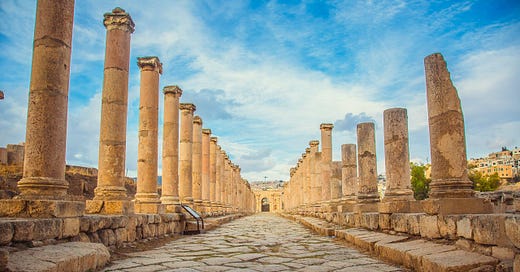Property
When we think about property rights today, many of us — especially those with a libertarian bent — envision a clear, individualistic framework. We picture Rothbard’s axioms: you own yourself, you own what you produce or homestead, and you can exchange or gift property as you see fit. It’s clean, logical, and feels like the natural endpoint of human reasoning.
But I was listening to a podcast the other day that got me thinking: this view is a modern invention, and assuming it’s how humans always operated is a classic case of presentism — projecting our current values and concepts onto the past.
In ancient times, property wasn’t a spreadsheet of individual claims enforced by a neutral court. It was a messy, collective affair, often decided by who had the sharper spear or the bigger tribe. The podcast dove into how early societies (like those in Mesopotamia or pre-Roman Europe) treated land and resources as communal, with allocations doled out by chieftains or councils.
If you tried to fence off a plot and declare it “yours” in 2000 BCE, you’d likely get a club to the head for your trouble. Property wasn’t a right. It was a privilege, granted by the group and backed by force. The idea of an individual staking a claim based on abstract principles? That would’ve sounded like gibberish.
This isn’t to say ancient folks were clueless. They had systems that worked for their time — systems built on survival, not philosophy. It took centuries of trial and error, from feudal land grants to Enlightenment thinkers like Locke, for us to “discover” the merits of private property.
And even then, it wasn’t a straight line. The Magna Carta, for instance, wasn’t about universal rights. It was barons strong-arming a king to secure their privileges. The evolution of individualism was slow, bloody, and anything but inevitable. We only got here because people experimented, fought, and sometimes failed spectacularly.
Science
This habit of assuming the human concepts of past mirror those of the present doesn’t just mess with our understanding of property. Take science, for example. We love to pat ourselves on the back, thinking science “replaced” religion or myth, like it’s version 2.0 of human thought.
That’s nonsense. Science isn’t an upgrade to those systems; it’s a completely different beast. Religion and myth wrestle with meaning, values, and the nature of reality — big, messy questions about why we’re here.
Science? It’s about empiricism, stripped of all that. It measures, tests, and predicts, but it doesn’t tell you whether life is worth living or what justice looks like. Confusing the two is like mistaking a hammer for a painting — it’s the wrong tool for the job.
Democracy
We often assume democracy—one person, one vote—is the “natural” way to run a society, and that ancient people were just too backward to figure it out. But in ancient Athens, democracy was a radical experiment, limited to a tiny slice of male citizens, and most societies preferred kings, councils, or strongmen.
Even Plato thought democracy could devolve into mob rule. Judging, say, ancient Egypt’s pharaohs as “tyrants” because they didn’t hold elections ignores how their systems prioritized stability over our modern fetish for voting.
Presentism
The danger of presentism is that it blinds us to how humans actually think and adapt. If we assume ancient people were just dumber versions of us, we miss the context that shaped their world.
Property rights didn’t emerge because some toga-wearing genius read Human Action. They evolved through necessity, conflict, and the slow grind of human progress. Same with science—it wasn’t “discovered” to debunk gods; it was a method carved out to answer specific questions, leaving the big ones to philosophers and priests.
So next time you’re tempted to judge history through today’s lens, take a step back. Our ideas about property, science, or anything else aren’t eternal truths handed down from on high. They’re tools we’ve built, refined, and sometimes misused. Understanding that might just keep us humble—and a little wiser about where we’re headed.
Naturally,
Adam




Yes, there's a difference between property (useful things in the world that people can claim) and property *rights* (the priority of claim to the useful things). Each evolves over time; property depending on how our use-cases and ability to extract value from things change, property rights depending on how our ethics develop.